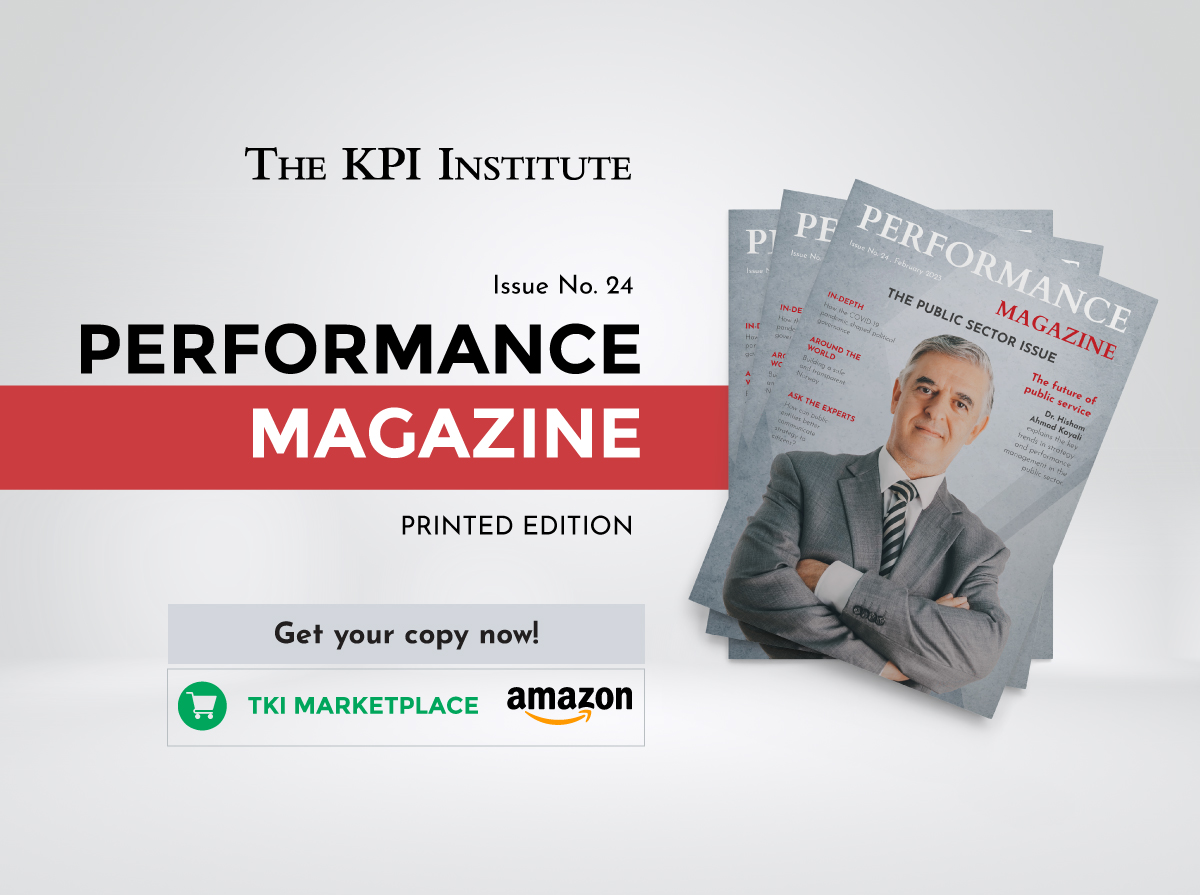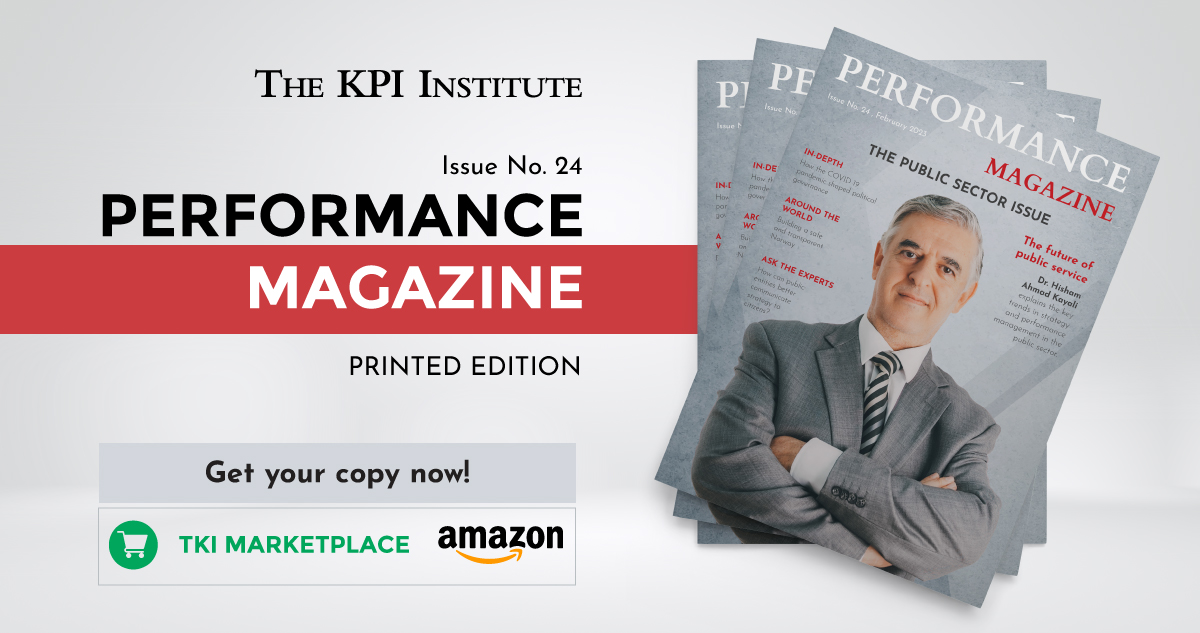
The United Arab Emirates: the world’s leader in government services
April 19th, 2023 Posted by admin Publications 0 thoughts on “The United Arab Emirates: the world’s leader in government services”
The United Arab Emirates (UAE) is the world leader in public services performance based on The KPI Institute’s Government Services Index 2022. The index is built on six dimensions that were chosen considering key value drivers for high-performing public services and includes 32 indicators. UAE has recorded an overall index score of 0.92 and above 0.80 for all indicators within the index, ranking first in two dimensions: Adaptability and Talent.
The report also shows that UAE ranks first in the Adaptability dimension, which is characteristic of future-oriented nations capable of reacting to unforeseen developments by equipping themselves with innovative technology and benefiting from international and domestic societal support.
Embedded in the country’s history, with a background of welcoming trade and business that goes back to early Gulf Cooperation Council (GCC) moments, the UAE has one of the most open economies in the world. UAE scored above 0.90 in all indicators of the Adaptability dimensions, from Value System (1.0000) to Legal framework’s adaptability and Digital business models (0.9132).
With a top score as far as the value system indicator, correlated with a high score of national culture, the UAE demonstrates how the value system of their society, together with a strong sense of national identity, supports long-term welfare and competitiveness.
The UAE has understood the importance of adaptability as a factor of development, and it has taken great measures to enhance it over the years. The country’s initiatives ensure that government entities and the business environment cooperate and align their efforts to boost competitiveness while stimulating innovation and digitization as well as achieving social cohesion through prosperity and well-being for the members of the society. Based on that, the country has efficiently managed to weather the pandemic. The government’s responsiveness to the changes imposed by the COVID-19 crisis has been immediate and promoted further actions to mitigate its effects on the economy.
Foreign direct investments were already encouraged, but the government’s efforts focused on increasing the liberalization of business activity in the middle of a pandemic. The Federal Law on commercial businesses was amended to remove the constraints that required all businesses to be chaired by UAE citizens and have 51% of shares held by an Emirati national. Now, more than 40 free zones allow 100% foreign business ownership. To stimulate the diversification of the economy, 122 economic activities across 13 sectors are qualified for the new law.
A Virtual License system was launched in alignment with UAE’s positive attitude towards globalization and the local governmet’s achievements in the field of digital transformation. This system aims to allow foreign investors to virtually obtain permission to do business in the emirate of Abu Dhabi from anywhere in the world and thus enable cross-border digital trade. This openness to international business is not recent. The United Arab Emirates has a long history of encouraging private-sector growth through international trade sustained by numerous Free Trade Agreements with trade-related infrastructure and services.
Furthermore, the flexibility shown by the country’s authorities in addressing the current market challenges is a result of the frameworks that facilitate the adoption of new technology starting from 2001, with the launch of the UAE e-government portal. Since then, the government has implemented important advances in the digital transformation field. Federal Network (FedNet) is an initiative that connects government entities through a safe, ongoing, and private infrastructure. The UAE Pass provides citizens a digital identity that helps them access government services. The UAE Strategy for Artificial Intelligence focuses on transforming the country into an early adopter of emerging artificial intelligenece (AI) technologies in education, economy, government development, and community happiness. Emirates Blockchain Strategy aims to capitalize on blockchain technology to transform 50% of government transactions into the blockchain platform.
The latest initiative is the Digital Economy Strategy. It aims to double the contribution of the digital economy to the UAE’s non-oil gross domestic product (GDP) from 11.7% to over 20% within the next 10 years.
The UAE maintains its performance in the Talent dimension of the GSI, ranking first in the global hierarchy. Traits such as flexibility in policymaking, successful use of international assistance, a knowledge-based economy, and attractiveness for the skilled workforce, define a country excelling in this dimension based on the Index.
Seen as a pillar of stability in the region with high credibility in the international community, the UAE has an outstanding performance, registering scores above 0.90 for all indicators of the dimension, including Effective use of support (1.000), Policy learning (0.9932) and Brain retention (0.9108). The Effective use of international support indicator top score outlines the country’s affinities towards bilateral relations, while the Skilled labor pool and Competent senior managers indicators’ high scores are evidence of a competitive knowledge economy that prioritizes labor market productivity and economic growth.
The UAE has diplomatic relations with most countries of the world. It is a member of international organizations like the United Nations, the World Bank, the International Monetary Fund, and the Organization of the Petroleum Exporting Countries and a founding member of the Gulf Cooperation Council. Over the years, the government has capitalized on international Talent while working to refine and enhance its laws and institutions. As a result, it has become a role model of leadership and cohesion nowadays. Furthermore, the country’s response to the pandemic has demonstrated the sustainability of its development model.
The stability and adaptability in face of crises have made the UAE a pole of attraction for migrant workers, who account for over 90% of the country’s workforce. Thus, several policies and initiatives aiming to support the labor market amid the ongoing pandemic have been launched.
One of them is the amendment of the Executive Regulation of the Federal Law “concerning Nationality and Passports.” The changes will allow investors, specialized talents, professionals, and their families to acquire Emirati nationality under certain conditions that will facilitate labor market efficiency and flexibility by enlarging the pool of talent.
The National Employment Strategy 2031 also supports the government’s efforts to build a “knowledge-based economy.” It promotes entrepreneurship and lifelong learning, cultivating the skills of the future, and enhancing knowledge and cultural diversity as means to attract skilled labor, especially women, in sectors such as technology, energy, transportation, and advanced science.
By being future-oriented and taking proactive actions, the UAE has successfully developed a governance model that can adapt and innovate in unforeseen conditions. Open to international relations, the UAE has become a thriving hub for global trade and a focal point for foreign investments. In turn, it has created job opportunities that attract within the local labor market’s various cultures and worldwide expertise. These considerations, correlated with the accomplishments in the indicators of the GSI 2022, make the UAE a leader in government services with best practices to learn from.
************************
This article was first published in the 24th printed edition of PERFORMANCE Magazine. You can get a free digital copy from the TKI Marketplace here or purchase a print copy from Amazon for a nominal fee here.




